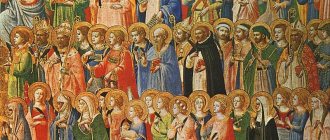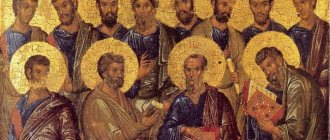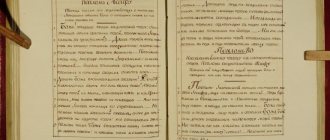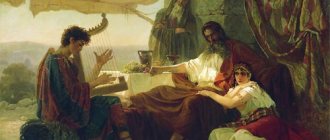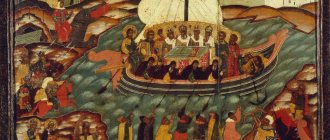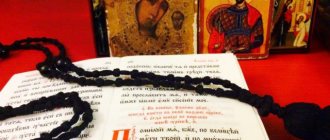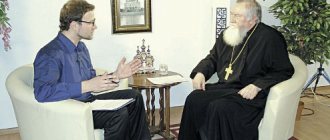MODERN AND ANCIENT HOLY FATHERS ABOUT THE GREAT BENEFIT OF READING THE PSALMTER!
Anna Georgievna, an admirer of St. Blessed Matrona, says: “My sister Natalya died, I buried her, and on the 40th day I saw my sister in a dream, and she told me: “You always scolded me for wasting a lot of time.” , endlessly recording the dead, recording acquaintances and strangers. And when I went through the ordeal, I passed through it like an arrow. Screams came from everywhere: “Lord, have mercy on Natalia, she remembered us!”
In the life of the inhabitant of the Pskov-Pechersk Lavra, schema-abbot Savva (Ostapenko) (+1984) in his youth, there was such a case: he was reading the Psalter for the dead and one day he fell asleep. And he saw in a dream that he was looking out the window, there were a lot of people of different ages there , they rejoice, wave their hands, greet. Then he realized that these were the dead who were thanking him for reading the Psalter for the dead.
St. Paul “... Be filled with the Spirit, speaking to yourselves in psalms and hymns and spiritual songs, singing and making melody in your hearts to the Lord, always giving thanks for everything to God the Father in the name of our Lord Jesus Christ” (Eph. 5:19 -20)
MARKEL - monastery presbyter from the Lavra of Cells Believe me, children, nothing outrages, worries, irritates, hurts, humiliates, insults and arms the demons and Satan himself, the culprit of evil, against us, as a constant exercise in psalmody. All Holy Scripture is useful, and reading it causes a lot of trouble for the demon, but nothing crushes him more than the Psalter. While practicing psalmody, we, on the one hand, offer up a prayer to God: according to Thy great mercy and according to the multitude of Thy compassions, cleanse my iniquity (Ps. 50:3), also: do not cast me away from Thy Face, and do not take away Thy Holy Spirit from less (Ps. 50:13); do not reject me in my old age, when my strength fails, do not forsake me (Ps. 70:9). On the other hand, we curse the demons: may God rise again and His enemies be scattered, and may those who hate Him flee from His presence (Ps. 67:2); in the same way: scatter the tongues, who want to fight (Ps. 67:31), or: I saw the wicked, exalting himself and towering like the cedars of Lebanon, and passed by, and behold, and sought, and his place was not found (Ps. 36 , 35-36); - also: let their sword enter into their hearts (Ps. 36:15) - or also: a pit of graves, and fossils, and they will fall into the pit that they made. His illness will return to his head, and unrighteousness will come down to his top (Ps. 7: 16-17).
Venerable Arseny the Great One monk asked the monk what he should do when, while reading the psalms, he did not understand their meaning. The saint replied that he should continue reading, because “the demons understand and run away.”
Venerable Ephraim the Syrian: Let the psalm be continually in your mouth. Where there is a psalm of contrition, there is God with the Angels. The psalm is the joy of lovers of God: it drives away idle talk, stops laughter, reminds of judgment, arouses the soul to God, and unites with the Angels. The psalm makes the holidays bright, it produces sorrow for God. The psalm also sheds tears from a heart of stone. The Psalm is the work of Angels, Heavenly residence, spiritual censer. Psalm - enlightenment of souls, sanctification of bodies. Psalm - attracting Angelic help, a weapon against the fear of unnecessary things, peace from the daily labors, safety of babies, decoration for the elderly, comfort for the elderly, decent decoration for women. Psalmody and prayer with humble thoughts elevate the mind above illicit passions and make the soul more courageous to desire Heavenly blessings.
St. John Chrysostom: He who sings psalms, even though he is extremely depraved, being ashamed of the psalm, curbs the power of voluptuousness, and, although he is burdened with countless vices and overcome by despondency, enjoying the pleasure, he lightens his thoughts, inspires the mind and elevates the soul. If you have fallen into temptation, you will find abundant consolation in the psalms; If you sin, you will find thousands of ready-made medicines here, whether you fall into poverty or into some kind of misfortune, (the psalms) will show you many havens. Psalmody is always a triumph for those who rejoice, a consolation for those who are despondent... It tames passions like wild animals: it curbs intemperance, extinguishes injustice, supports the truth, casts down blasphemous thoughts, kills shameful thoughts, proclaims the Divine law, preaches God, explains the faith, stops the lips of heretics, builds the Church.
Saint Basil the Great: The Book of Psalms... is a common treasury of good teachings and carefully seeks out what is beneficial to everyone. She heals the old wounds of the soul, and gives quick healing to the recently wounded, and restores the painful, and supports the undamaged; in general, as much as possible, it destroys the passions that dominate souls in human life under different forms. The psalm is the silence of the soul, the dispenser of peace. It softens the irritability of the soul and disciplines intemperance. It calms rebellious and disturbing thoughts. The psalm is a mediator of friendship, unity between distant people and reconciliation of those at war. For who can
History of the composition and poetry of the Psalter
Psaltirion, in Greek, is a stringed musical instrument, accompanied by which in ancient times prayer chants addressed to God were sung, hence the name psalms, and their collection began to be called the Psalter. The psalms were combined into one book in the 5th century BC. This book in its Hebrew original is a collection of hymns of religious and lyrical content and mood, which were performed during worship in the ancient Jerusalem temple during the era of state independence of the Kingdom of Judah. Therefore, they became unusually widespread both in the pre-Christian era and especially during early Christianity. The Psalter was translated into the Slavic language from Greek in the initial period of the development of writing in Rus' by Saints Cyril and Methodius - after all, without its text it was impossible to perform a single church service. Since even in the early Christian era the Psalter satisfied various needs, there were editions of this book, depending on its practical purpose. This is how the main types of psalter texts arose: the Psalter followed (or “with recitation”), used in church services, and the Psalter explanatory (with interpretations of the text compiled by Athanasius of Alexandria, Theodoret of Cyrrhus and other early Christian authors). In the first half of the 16th century. In Moscow, a new translation from Greek of the explanatory Psalter was made by Maximus the Greek (Trivolis). The texts of the 150 psalms that make up the Psalter were translated from Hebrew into Greek along with other parts of the Septuagint (translation of the books of the Old Testament by seventy commentators). An additional Psalm 151 was added to them, revealing the life of David, the king and poet, with whose name a significant part of the psalms are inscribed. Despite the fact that they are known under the name of David, there is no indication that they all belong to the king and the prophet. Saint Athanasius the Great believes that the inscriptions show who owns any psalm. David chose four captains of singers and two hundred and eighty-eight to serve them. Therefore, as can be seen from the inscriptions, the psalms of these four leaders are found. Thus, when it is said: a psalm to the sons of Korah, Etham, Asaph and Eman; this means that they sing the psalm. When it is said: a psalm of Asaph or Idithum, then it is shown that this psalm was spoken by Asaph or Idithum himself. If it is said: a psalm of David, it is shown that the speaker was David himself. When it is said: a psalm to David, it means that others are speaking about David. In the Psalter of 150 psalms, part refers to the Savior - the Lord Jesus Christ; they are important in soteriological terms (soteriology is the doctrine of saving a person from sin). These psalms are called messianic (Messiah, from Hebrew, means Savior). There are messianic psalms in the literal and in the educational sense. The first ones talk about the coming Messiah - the Lord Jesus Christ. The latter tell about the persons and events of the Old Testament (King and Prophet David, King Solomon, etc.), prefiguring the New Testament of the Lord Jesus Christ and His Church.
Already in the early Christian era, the Greek translation of the Psalter formed the basis of Christian liturgy and hymnology. As part of the so-called “daily” services (midnight office, matins, hours, vespers and compline) about 50 separate psalms are used. In the modern liturgical Charter of the Orthodox Church, it is customary to divide the Psalter for convenience when using it during worship and in the home (cell) rule into 20 sections - kathisma (kathisma), from the Greek. “kafiso” - “sitting”, each of which is divided into three “Glory”, or articles.
Order a reading of the Unending Psalter in Jerusalem
The psalms are full of genuine poetic feeling, preserved in their Slavic translation. They served as a source of inspiration for all Russian authors without exception until the 18th century. - from Metropolitan Hilarion and the authors of The Tale of Bygone Years to Lomonosov and Derzhavin, and even in the 19th - 20th centuries. echoes of the poetry of the psalms are heard in the poems of Pushkin, Lermontov, Yazykov, Fyodor Glinka, and Bunin. The essence of the poetic structure of the psalms is the semantic and syntactic parallelism (direct or reverse) of each verse that makes them up. This poetic structure formed the basis of all ancient Eastern poetry, and then became leading both in Byzantine hymnology and in Slavic-Russian original poetry. The Psalter served not only as a liturgical book, but also as the main textbook. According to it until the 19th century. inclusively taught to read and write, which is well known and which is once again proven by recently found letters on birch bark: one of them belongs to the Novgorod boy Onfim, who studied in the 13th century. and wrote out the text of the “Great Compline” service on birch bark. All this invariably supported the popularity of the Psalter in medieval society, and therefore the number of ancient manuscripts of the Psalter is much larger than all other texts, and is second only to copies of the Gospel.
Question 11. Sinners bind the righteous
Ps. 119:61 Now the sinner has bound himself to me, and has not forgotten thy law.
It already means bonds. The chains of sinners have bound me, and I have not forgotten Your law.
Athanasius the Great asks:
What kind of snakes were they? Were these not evil thoughts with which they intended to cast me down from my position in God?
And here is how Theodoret explains:
The Prophet called the machinations of either demons or people snakes, taking a tightened knot as the reason for this way of speech. This is what Isaiah said: woe to those who draw back their sins, for they are already long ( Is. 5:18 ). When these snakes, says the Prophet, were tightly tightened on me, I did not leave the remembrance of God’s law. Then he explains the reason for remembering.
At midnight I rose to confess to You about the destinies of Your righteousness (At midnight I rose to glorify You for Your righteous judgments).
because not only during the day, but also at night, even at midnight, when sleep brings great pleasure to people, I did not stop hymning You and praising Your truthful decrees. So the divine Apostle, together with Silas, when, after beating and scourging, their feet were stuffed in the treasure, with prayer they dissolved the chant, and reaped the fruit of good vigil; because you have been deemed worthy of God's mercies ( Acts 16:24 ).
Question 2. Prayer of a despondent beggar
Ps. 101:2 Even if I mourn a day, incline Your ear to me
Vonzhe - in which. Here the preposition in, the pronoun this or he and the particle are combined into one word.
Here is the beginning of this psalm: Lord, hear my prayer, and let my cry come to You. Do not turn Your face away from me: even if I mourn for a day, incline Your ear to me: even if I call on You for a day, hear me soon.
This psalm has a title (or “inscription”): The prayer of a beggar, when he is discouraged, he will pour out his prayer before the Lord.
St. Theodoret of Cyrus believes that a beggar is each of us:
every person who struggles with disaster and asks for God's help; because the Prophet calls the one who needs God’s providence for him a beggar.
St. Athanasius the Great: the beggar is all the prophets of God who grieve over the disastrous fate of the people. The prophet “comes to the Lord, sending up prayers in fasting and tears for this people, so that they too may be spared.”
The psalm contains a prophecy that the pagans will be called to the Church of Christ and the salvation of mankind thanks to the coming of Christ:
And the nations will fear the name of the Lord, and all the kings of the earth will fear Your glory, for the Lord will build Zion and appear in His glory. He respected the prayer of the humble and did not neglect their prayer. for He bowed down from His holy height, the Lord looked down from heaven to earth to hear the groaning of the prisoners, to free the sons of the slain, to proclaim the name of the Lord in Zion and His praise in Jerusalem, when the nations and kings were gathered together to serve the Lord.
Question 5. Man proposes, but God...
Ps.33:10 The Lord destroys the councils of tongues, and sweeps away the thoughts of men...
Councils of languages are the plans of nations.
St. Athanasius the Great gives an example of how God sweeps away thoughts:
For he made the plots of all the Jews unsuccessful by resurrecting on the third day.
Theodoret of Cyrus believes that this verse refers both to the victory of the Jews over the Assyrians in ancient times and to the successful preaching of the Gospel by the apostles, despite the attempts of the pagans to prevent them.
Question 9. Slander of enemies
Ps. 70:11 God has left him to eat; marry him and have him as if he had not delivered him.
In the psalm, these words are spoken by enemies: For my enemies have spoken to me, and those who lie in wait for my soul have decided together, saying: “God has forsaken him; pursue and seize him, for there is no deliverer.”
St. Athanasius explains that this is untrue and slander - this cannot happen without God forsaking:
My God, please help me. Let those who slander my soul be ashamed and disappear. When they attack me with the thought that I have been abandoned by You, and You will help me, then they will turn back with shame, finding that the slander they have laid against my soul is in vain. What kind of slander is this, besides the following: God left him to eat?
Question 6. Study of the commandments
Ps. 119:15 I will mock thy commandments, and understand thy ways.
To mock means to talk about the commandments, to study them.
This is the longest psalm in the book - it has 176 verses.
Athanasius the Great:
In this psalm, the prophet describes the life of the saints, their exploits, sorrows, labors, also the uprisings of demons, thousands of inspired thoughts, snares and other means of entrapment, and at the same time what the saints use to win: the Law, the words of God, patience, help from above, and finally, what follows the work, rewards, crowns, rewards.
Simply talking about the commandments is not enough. St. Athanasius the Great comments:
I will not limit myself to just verbal study, but I will try to understand how to fulfill them, because it is not the hearers of God’s justifications, but the creators of them, who are righteous before God. For in this case a person will never forget them.
Question 7. Cancellation of holidays
Ps. 73:8 They decided in their hearts together: “Come and let’s put aside all the holidays.”
The Yuzhiks are relatives.
The theme of this psalm is the distress of the Jewish people after the Assyrians captured Jerusalem and destroyed the temple. Everything is very bad: enemies are everywhere, God has abandoned his people, the earth is devastated, there are no more prophets. The pagans, who destroyed the country, decided, together with their close allies, to stop observing the holidays of God.
Their relatives said in their hearts together: “Come, and let us stop all the holidays of God on earth.”
Theodoret of Cyrus:
In great agreement among themselves, rushing towards us, they had one goal - to destroy the law given by You. For by the word: holidays the Prophet meant living in accordance with the law. They dared to do this, he says, without seeing the miracles that happened during the time of our ancestors, and without being convicted by prophetic grace.
Question 8. The sun is the creation of the Creator
Ps. 18:5 And He, as the Bridegroom proceeds from His palace, will rejoice, as the Giant of the mother-in-law is the way
Mother-in-law means to run away.
We are talking about the sun, which, like a bridegroom, emerges from the bridal chamber and joyfully runs its way across the sky.
This psalm about the glory of God begins like this: The heavens proclaim the glory of God, the heavens proclaim the work of His hands.
The Apostle Paul wrote about this message about God's created nature in Romans (1:20):
For His invisible things, His eternal power and Godhead, have been visible from the creation of the world through the consideration of creation.
Question 1. Horns and hooves
Ps. 68:31 And God will be more pleased with a young calf that has horns and claws
Taurus Yun is a sacrificial animal with horns and hooves.
Meaning: Prayer and thanksgiving are more pleasing to God than sacrifices.
Psalm 68 is David's appeal to God for help in the face of unjust persecution.
St. Athanasius the Great proposes to understand this psalm as a prayer that Christ says on behalf of all humanity and in which His death and the disasters of the Jews after this are described.
Prophetic verses about Christ in this psalm include:
Art. 5 Those who hate me without cause are more than the hairs of my head; my enemies, who persecute me unjustly, have become stronger; what I did not take away, I must give. - about the persecution of Christ by the Pharisees and Jewish leaders.
Verse 10 For zeal for Your house consumes me, and the slander of those who slander You falls upon me; — about Christ’s expulsion of the merchants from the temple: John. 2:13-17 .
Verse 22 And they gave me gall for food, and in my thirst they gave me vinegar to drink. – They offered bile and vinegar to Christ on the cross: Matt. 27:34, 48 .
In addition, writes Athanasius, David depicts the introduction of the gospel life and the teaching of worship in spirit and truth, which ends the psalm:
I am poor and sick: let Thy salvation, O God, receive me. I will praise the name of my God with song, I will magnify Him in praise: and God will be more pleased with a young calf that has horns and claws. Let the poor see and be glad: seek God, and your soul will live. For when the poor Lord hears and does not despise His bound ones. May heaven and earth, the sea and all that live in it, praise Him. For God will save Zion, and the cities of Judah will be built, and will dwell there, and will inherit it, and will keep the seed of Your servants, and those who love Your name will dwell in it.


